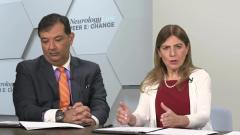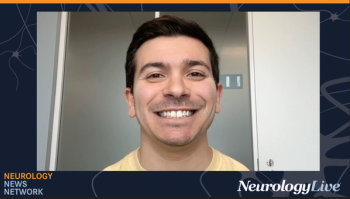
Management of Neuropsychiatric symptoms of Alzheimer’s Disease
Dr Atri emphasizes importance of managing neuropsychiatric symptoms in patients with Alzheimer’s disease and drugs under development.
Episodes in this series

Marwan Sabbagh, MD: These questions are to you, Dr Atri, about neuropsychiatric symptoms. That’s a huge driver of morbidity and mortality, particularly as the disease advances. We are able to articulate what we want to achieve, but as they advance, we’re dealing with different things in the moderate states than we are in the mild stage, and neuropsychiatric features. Can you comment on the traditional medications we use to treat neuropsychiatric symptoms? Also, comment on the new drugs that are under investigation, and some that were reported on here at CTAD [Clinical Trials on Alzheimer’s Disease conference].
Alireza Atri, MD, PhD: Yes. I agree with you. I’m a cognitive neurologist, but you can support cognition and function if the neuropsychiatric symptoms and the behavior are under control. But if you have somebody who is agitated, delusional, paranoid, and resistive, it affects quality of life and function, and their care. Behavior is paramount and affects quality of life. I’ll put a plug in for our Harvard Medical School dementia course, what you asked me about is a day to day and a half of our course. I’m going to try to say something in 2 minutes. But ultimately, the first part is recognition. And education, again, is it apathy, lack of motivation, which oftentimes gets misdiagnosed early as depression? It’s not uncommon for patients to come to us, and no one’s recognized the cognitive issues, but they recognize a lack of motivation as apathy, and they are already on an SSRI [selective serotonin reuptake inhibitor]. That’s different from true depression, or irritability, or anxiety, which can be also possible and needs to be treated, to agitation, aggression, frank psychosis; those are all different.
But the first step, again, is that knowledge, that recognition, the accurate diagnosis of it, and then looking at the triggers, what are the triggers? No. 1, 2, 3, 4, 5 is always being a detective, and asking and finding out, is it that they’re dehydrated? Do they have a UTI [urinary tract infection]? Is it that they’re not sleeping well? Is it that no one’s talking to them? Do they have joint pain, arthritis that people don’t realize? Many of those things could be environmental, and amenable to that. But when it becomes severe, for example, if you have ultimately very severe aggression, or agitation, or psychosis that is immediately harmful to somebody’s safety, the patient included, then we have a limited armamentarium. There’s a great need for that, there’s nothing in the United States that’s approved. Clinicians are reaching for things.
I would say one standard part of this is not to minimize the effect of background therapy. Cholinesterase inhibitors like memantine, there are many years of data that suggest that, like if you have a pot of water that’s going to boil, it turns on the heat a bit. In the longer term, it’s not like, “Gosh, you’re psychotic or agitated, I’m going to give you the memantine, and tomorrow you’re going to get an effect.” But it’s something as a background that people shouldn’t minimize. The off-label things people use sometimes are antipsychotics, which have a black box warning because they’re associated with an increase in morbidity, mortality, including extrapyramidal symptoms, sedation, falls, which can’t be minimized, but sometimes you have to pull the trigger. That has to be done judiciously. Sometimes individuals use SSRIs, there are some data on that from the citalopram study.
I’ll put in a plug in for escitalopram, which is being studied, too, but it’s being used so widely because of the black box warning that we sometimes have difficulty recruiting patients. But what do we give up there? We give up cognition, QT intervals can be affected. There are some new data that were presented here for things like brexpiprazole. Again, it does not have the indication yet, but it was promising, not just from the efficacy side, but also on the safety side. If those things bear out, that would be something we could add to our armamentarium. There are other drugs that have been investigated, pimavanserin, some forms of dextromethorphan, with other things added to increase availability. But this is an area of great need, I have to say.
Transcript edited for clarity
Newsletter
Keep your finger on the pulse of neurology—subscribe to NeurologyLive for expert interviews, new data, and breakthrough treatment updates.





























